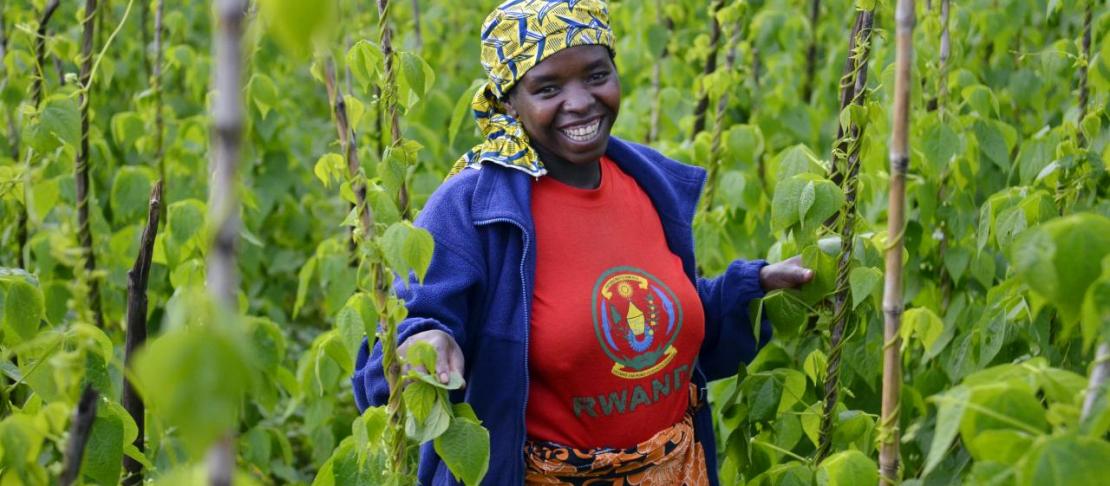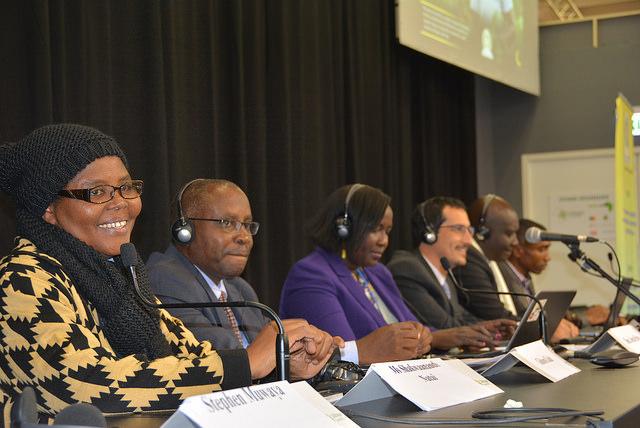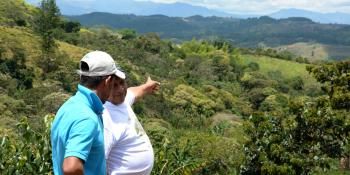Ready for take-off: East African countries develop climate-smart agriculture frameworks

Report back from African Pavilion side event on country CSA programs at the just concluded UN Climate Change Conference (COP21).
Countries in East Africa are ready to tackle the impacts of climate change in the agricultural sector by implementing climate-smart practices. With guidance from several key regional economic communities (RECs) and the CGIAR Research Program on Climate Change, Agriculture and Food Security (CCAFS), Kenya, Uganda and Tanzania have set up enabling frameworks to address climate related risks that impact on food security. These countries (together with Botswana and Namibia in Southern Africa) have prepared country climate-smart agriculture framework programs (CSA-FPs), thereby planning responses and integrating climate resilience into their agricultural development plans.
East African policy makers, researchers and development practitioners shared their experiences on preparation of CSA-FPs at a side event held on 4th December at the African Pavilion during the United Nations climate talks (COP21) held in Paris from 30th November to 11th December 2015. The event was hosted by CCAFS and the East African Community (EAC).
Regional Economic Communities Play Essential Roles
In her keynote remarks, Hon. Jesca Eriyo, Deputy Secretary General, EAC, emphasized that one of the key roles of RECs such as the EAC is to support the implementation of the Comprehensive Africa Agriculture Development Programme (CAADP) framework at national levels.
“The EAC will support the establishment of national CSA task forces to provide technical oversight in the implementation of pilot projects and promotion of national CSA policy and practices. Additionally, the task forces will oversee the development of CSA investment frameworks to mobilize additional resources for up-scaling CSA activities in partner states,” Hon Eriyo said.
Presentation: CSA policy framework and coordination in the East African Community: role of RECs
The Science-Policy Interface
The role of science in informing policy design and implementation cannot be overlooked. Evan Girvetz, a CCAFS scientist based at the International Center for Tropical Agriculture (CIAT) demonstrated this through his presentation on mainstreaming CSA in national programs and policies. He pointed out that the focus of the program is to use science to support CSA integration across scales in Africa from continental, regional, national to local level actions. This is achieved through a ‘CSA plan’ which comprises key steps: situation analysis, targeting and prioritizing, programing design and monitoring and evaluation across scales and systems all undertaken through engagement and capacity building.
Read more: climate-smart agriculture plan: a guide to scaling CSA
Gideon Galu from the Famine Early Warning Systems Network (FEWSNET) made a presentation on climate-smart tools for East Africa. He highlighted climate datasets and tools such as Climate Hazards InfraRed Precipitation (CHIRP 2.0), GeoClim and Community Based Adaptation (CBA) which can be used to identify risks and vulnerabilities across scales and systems and also subsequent adaptation strategies. Galu also emphasized that post COP21 partners need to enhance quality, quantity and applications of climate services in-line with the Global Framework of Climate Services (GFCS).
Zeroing in to National and Local Scales
National CSA-FPs were presented from three countries; Tanzania, Uganda and Kenya by the following:
- Ms Shakwaanande Natai, Head, Environment Management Unit Ministry of Agriculture Food Security and Cooperatives, United Republic of Tanzania – view presentation
- Stephen Muwaya, Sustatinable Land Management Program Coordinator/CSA Focal Point Ministry of Agriculture, Animal Industry and Fisheries, Republic of Uganda – view presentation
- Vincent Ogwang, Ministry of Agriculture, Livestock and Fisheries, Republic of Kenya – view presentation

The panelists during the COP21 Africa pavilion side event on taking forward implementation of national climate-smart agriculture plans. Photo: V. Atakos (CCAFS)
The CSA-FPs aim to deliver on multiple benefits, including: food productivity and nutritional security, and incomes especially to women and other vulnerable groups; building resilience in the agriculture sector and the adaptive capacity of the farmers; and contributing to reducing or removal of greenhouse gas emissions from the agriculture and land use sectors thus contributing to the global public good. . While Kenya integrated adaptation and mitigation components from the CSA-FP into their Intended Nationally Determined Contribution (INDC), Tanzania, on the other hand, is using the plan developed as a foundational document to support a proposal to transform agriculture in the country to the Green Climate Fund (GCF).
Read more: Kenya integrates CSA into its INDC
In Tanzania, a program by the Alliance for a Green Revolution in Africa (AGRA) and Yara International intends to support CSA piloting in three districts of Mbeya region with target crops: cereals, legumes and oilseeds in the Southern Agricultural Growth Corridor of Tanzania (SAGCOT) region. This will enable smallholder farmers' transit towards more productive and commercial agriculture so as to improve their own livelihoods and the efficiency and sustainability of the sector. Uganda, on the other hand, has put in place institutional frameworks such as a multi stakeholder CSA taskforce (Community of Practice) and CSA Networks for CSOs, private sector and faith-based organizations to support the implementation of CSA in the country.
The national CSA-FPs can be accessed here.
Role of Civil Society Groups in CSA
Successful adoption and upscaling of CSA technologies and practices requires the participation and engagement of multiple stakeholders. Representing civil society organizations, Samson Ogallah, Programme Manager, Pan African Climate Justice Alliance (PACJA) emphasized that CSA policy and actions should achieve the following: protect livelihoods, tackle root causes, promote inclusive values and processes, promote sustainable partnerships, promote gender equality, build on previous success and finally, explore and expand new areas. Access his presentation on CSA: Building resilience and safeguards for smallholder farmers in Africa.
This side event provided an opportunity to dialogue on the appropriate policy and financing mechanism to scale-up the adoption of CSA practices in defined farming systems in East Africa. It is anticipated that the CSA-FPs will catalyze increased public-private sector investments to reach more than 100,000 agricultural service providers benefitting 10 million smallholder farmers (including women and youth) and small-scale food producers by 2025.
View pictures from the event on Flickr
Catherine Mungai is a Policy and Partnerships specialist while Vivian Atakos is a Communication Specialist. They both work for CCAFS East Africa. Brian Otiende works for the East African Community and is based at the Headquarters in Arusha, Tanzania.



